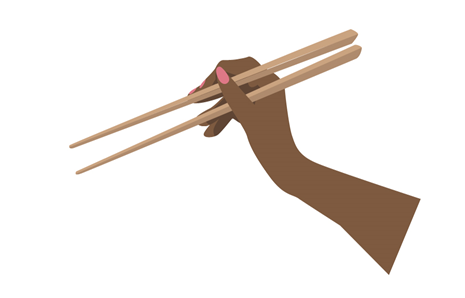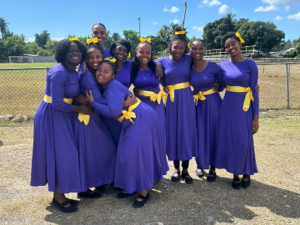“Every good and perfect gift is from above, coming down from the Father of the heavenly lights, who does not change like shifting shadows” – James 1:17 (NIV)
This article was written to highlight non-traditional careers in an effort to encourage people, especially students to think outside the (career)box. This is becoming increasingly important for the world in which we now live where more and more persons are turning to internet-based learning and jobs, which, thankfully, is helping to reduce the malady of brain drain in developing countries. It was written to also emphasise that as long as God is kept at the centre of your career/work (geo-scientist, scholarship training coach, singer, dancer, the man on the corner selling soup, the vendor in the market, etc.) – whether you are living in your country of birth or not, you are set to succeed. Remember, “The blessing of the Lord, it maketh rich, and addeth no sorrow with it.” Proverbs 10:22 KJV
Miss Tracy-Ann Hyman, a woman of God, is an author, singer, coach of scholarship applicants, trainer, and speaker. A geo-scientist by profession, she has worked for nearly 20 years in the fields of Environmental Science and Management, Disaster Management, and Information and Communication Technologies.

EARLY LIFE
Tracy-Ann was born in Kingston, but moved with her parents to St. Mary in 1984 as a child, in fulfillment of her father’s work obligations. She attended St Cyprian’s Prep in Highgate, sat the Common Entrance examination, and was awarded a place at St. Mary High School but transferred to St. Andrew High for Girls, when the family returned to Kingston. She completed university studies in Business Admin and Hotel Management; and thereafter worked at a local restaurant in Kingston, before pausing for a while at a top hotel in St. Mary.
Tracy-Ann, who attended church throughout her childhood, joined the Inter Schools Christian Fellowship (ISCF) during high school. How did this impact her? She accepted Christ in 1993 and played an integral role in ISCF throughout her time in secondary school.
NOT IN THE TOP 5 CAN MAKE YOU FEEL SMALL
When asked if she was considered brilliant in high school, her response was “No”. She highlighted the challenges within the Jamaican school system at that time, particularly the plight of students who did not place first, second or even third in class, but were still above average in terms of their grades. She said this was demotivating as it made some students feel that they were not good enough because they weren’t in the top 3 or top 5 positions in the class. She thinks this method of rewards is probably due to scare resources or stems from a particular cultural mindset which singles out the ‘brightest’ in the class. Nonetheless, Tracy-Ann is convinced that this system of according prizes to only the top 3 to 5 students should be revisited as feelings of inadequacy remain with some even into their adult years.
This argument though could be countered by the practise in other jurisdictions where everyone is considered a winner and is accorded the same privileges. This environment breeds its own set of problems as students do not experience disappointment and failure, and so are unprepared for challenges in the real world.
THE ROAD TO JAPAN
When Tracy-Ann decided to pursue a master’s degree in Environmental Management, Europe was where she looked for scholarship opportunities. Her first choice, the continent appealed to her as she imagined the wonderful experiences she would have living in such a grand place. She dreamt of glamour and glitz and delightful new encounters. However, this did not materialize. Instead, she was offered the opportunity to pursue a two-year master’s degree in Sustainability Science, majoring in Environment Systems at one of the most prestigious universities in Asia – the University of Tokyo. When she recalled the old adage – “a bird in the hand is worth more than two in the bushes”, she quickly seized the opportunity. There was no time for delay anyway or even to learn a bit of Japanese. She had to move swiftly in order to ensure she did not forfeit the scholarship opportunity.
CHALLENGES BUILD CHARACTER
Japan proved challenging at first for Tracy-Ann, being one of the few black persons in her community of Kashiwa, Chiba. She avoided eating out a lot as she was too embarrassed to be asking for a knife and fork, when everyone else was using chopsticks! It took her just over a year to overcome her fear and master what she considered “an art of eating”.
Other impediments she faced served to build her character and engendered good, life-long habits. For example, the transportation system in Japan was run with precision. Trains, buses and taxis all operated like clockwork, like a well-oiled machine and one had to be on time in order to use it. Being punctual became habitual for her!
In overcoming difficulties, Tracy learned to dig deep and rely on God for inner strength to propel her to a place of comfort and acceptance of the differences around, and within her. This helped to build her character, so she could better cope with the things that made her uncomfortable. For instance, when faced with curious stares by persons on the bus or train because she was the only black person on board, she simply stared back until they looked away!
TOKYO BAPTIST CHURCH AND THE BIG EARTHQUAKE
Having completed her Master’s Degree in Sustainability Science with a focus on Environment Systems in 2010, Tracy-Ann went on to teach English to Japanese students. She had also learned to successfully navigate the challenges of Japan, developed relationships, used a bicycle as her main source of transportation, located the Tokyo Baptist Church which was several miles from where she lived and studied, and became part of a small Bible study group that provided support for its members. The group was tremendous in helping her to adjust and develop a sense of self in Japan; and speaks to the need for community in every aspect of life.
The group had great missionary plans to assist persons living near the church, but these were abruptly interrupted by the March 11, 2011 Tōhoku earthquake. On the day the biggest earthquake in Japan’s history occurred, Tracy had taken the train, but God has a way of caring for His people; for when she felt the first tremor, she had just arrived at her destination – inside a friend’s home. She hadn’t even removed her thick winter jacket and boots yet, when household items started flying all around her. Sixty seconds of warning were all the people got before the six agonizing minutes of shaking and rumbling that also triggered a massive, killer tsunami began. It claimed the lives of approximately 20,000 persons and left behind damages amounting to US220 billion dollars.
BACK TO JAMAICA – VOLUNTEER
Tracy left Japan after the earthquake, and was unable to return to her teaching job there although she really wanted to do so. Proverbs 6:9 says, “A man’s heart plans his way, but the LORD directs his steps”. Back in Jamaica, the search for work at first proved futile.
School-leavers, when you are facing a situation similar to Tracy’s: fresh out of school with no job in sight; one of the things you are encouraged to do is volunteer. Even when you are in school – volunteer, as it helps to prepare you for the working world and can equip you with invaluable experience.
Tracy volunteered at Wycliffe Caribbean as part of their Bilingual and Biliteracy Project (Jamaican Creole); and also secured part-time employment at the University of the West Indies as a researcher. She returned to church at Fellowship Tabernacle, where she served in the hospitality and praise and worship ministries.
BIRTH OF SKOLASTIK OASIS CARIBBEAN
Tracy began seeking the Lord for direction concerning her career path. When the Holy Spirit prodded her to open her eyes, she started observing that some persons just did not know how to promote themselves effectively, when seeking out global opportunities. Through modesty perhaps, or simply a lack of knowledge, people neglected to highlight their achievements, and actually paid very little attention to important aspects of their personal growth and development, which would impress sponsors and scholarship selection committees. Tracy commenced providing free academic guidance for such persons, in order to make themselves more marketable. Then one day, the Holy Spirit prompted her again: it was time to launch her new business and charge a fee. Such was the genesis of Skolastik Oasis Caribbean (SOC) in 2016.
Although there were already a few persons in the market offering this service, Tracy-Ann Hyman found a niche. SOC’s business offerings have now expanded – in addition to providing guidance for scholarship applicants, it also grooms clients for scholarship interviews, as well as helps social businesses secure international funds. These coaching and consultation services are sought by Caribbean nationals wanting to study or do business in the global arena.
Skolastik Oasis is growing, and whereas the financial returns are not yet commensurate with the quality and efficacy of the product; Tracy continues to pray that this challenge will soon be overcome.
FROM A CAR TO A BICYCLE AND FORK TO CHOPSTICKS
Tracy-Ann proudly speaks of completing her recently published book which details her experiences in Japan. Entitled, “How Do You Use Those Darn Chopsticks?! A Memoir of a Jamaican Woman who Lived and Studied in Japan”, it is available on Amazon or at https://skolastikoasiscaribbean.wordpress.com/2022/03/11/get-your-darn-chopsticks-book-packages-directly-from-us-soc-they-make-great-gift-ideas/
She has also written two songs for the book: “Hashi” and “A Black Girl Pon a Japanese Train”. Don’t be fooled by her delicate features, she is the singer of those two tracks which can be found on YouTube.
In the diagrams below, she has shared a simple tutorial on how to use chopsticks.
Chopsticks 101
Name and Number the fingers

- The thumb; 2. The index finger; 3. The middle finger; 4. The ring finger; 5. The pinky finger
There are two sticks – use the thumb, index finger and middle finger to hold the top chopstick which is the one that moves vertically (up and down) to pick up the food. Then, use the ring and pinky fingers to hold the second stick which must not move. The top chopstick moves and picks up food, while the pinky supports the ring finger, ensuring that the bottom stick is held firmly in place. Itadakimasu – Let’s eat!
Miss Tracy-Ann Hyman is also author of International Government Scholarships 2019 – 2020, and can be reached at: skolastikoasiscaribbean@gmail.com.





